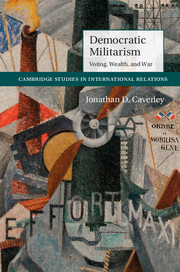Book contents
- Frontmatter
- Dedication
- Contents
- List of figures
- List of tables
- Acknowledgments
- 1 Introduction: sources of democratic military aggression
- 2 Cost distribution and aggressive grand strategy
- 3 Analyses of public opinion
- 4 Analyses of arming and war
- 5 British electoral reform and imperial overstretch
- 6 Vietnam and the American way of small war
- 7 Becoming a normal democracy: Israel
- 8 Conclusion: strategy wears a dollar sign
- Bibliography
- Index
6 - Vietnam and the American way of small war
Published online by Cambridge University Press: 05 July 2014
- Frontmatter
- Dedication
- Contents
- List of figures
- List of tables
- Acknowledgments
- 1 Introduction: sources of democratic military aggression
- 2 Cost distribution and aggressive grand strategy
- 3 Analyses of public opinion
- 4 Analyses of arming and war
- 5 British electoral reform and imperial overstretch
- 6 Vietnam and the American way of small war
- 7 Becoming a normal democracy: Israel
- 8 Conclusion: strategy wears a dollar sign
- Bibliography
- Index
Summary
Maxwell Taylor, an architect of US Cold War grand strategy in general and the Vietnam War in particular, observed in that war's aftermath that “When one considers the vast resources committed to carrying out our Vietnam policy, the effective power generated there from seems to have been relatively small” (Taylor, 1972,402). What would cause a democracy to spend such vast resources to conduct a flawed counterinsurgency campaign? Why would leaders choose war despite intending to fight in a manner making failure more likely? This book's theory, illustrated in Figure 2.1, argues that civilian leaders, anticipating voter preferences, will deploy an inefficient strategy against an unconventional opponent in pursuit of moderate aims because the reduction in costs outweighs the sacrifice in expected value.
The case is an important one. Like the British Empire, Vietnam represents an “anomalous case,” for democratic exceptionalism (Downes, 2009). Many consider it as a paradigmatic example of capture of a state's grand strategy by an elite, in this case a myopic military obsessed with technology and firepower. Finally, interpretations of Vietnam continue to influence contemporary American strategic debates.
This chapter examines the development of American counterinsurgency strategy before and during the Vietnam War to competitively test my theory of moral hazard against other explanations for aggression from IR, historical, and policy-oriented research.
- Type
- Chapter
- Information
- Democratic MilitarismVoting, Wealth, and War, pp. 172 - 209Publisher: Cambridge University PressPrint publication year: 2014



